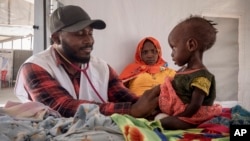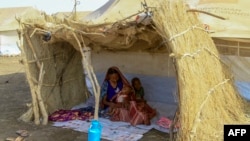Major relief agencies warn that time is running out for millions of people in Sudan, who are “at imminent risk of famine” because the country’s warring parties are preventing aid from reaching them.
Nineteen global humanitarian organizations, including 12 United Nations agencies, urged Sudan’s warring parties on Friday to stop blocking food aid from reaching millions of people suffering from acute hunger.
Jens Laerke, spokesperson for the Office for Coordination for Humanitarian Affairs (OCHA), told journalists in Geneva that heads of those agencies fear many of Sudan’s 18 million acutely hungry people, including 3.6 million children, will die if the blocked relief pipeline isn’t opened.
“If they continue to be prevented from providing aid in Sudan rapidly and at scale, a famine will likely take hold in large parts of the country. More people will flee to neighboring countries. Children will succumb to disease and malnutrition, and women and girls will face even greater suffering and dangers.”
According to UNICEF, acutely malnourished children are up to 11 times more likely to die than well-nourished children.
Sudan, which is in its second year of a raging conflict between rival military factions, is home to the largest number of internally displaced people in the world. The U.N. says that nearly 10 million people who have been uprooted from their homes are displaced inside the country. A further two million people have fled for safety to five neighboring countries as refugees.
“Attacks against civilians, including sexual violence, are multiplying, and hospitals and schools are also coming under attack,” Laerke said. “At the same time, aid workers face systematic obstructions and deliberate denials of access by parties to the conflict. Movements across conflict lines to parts of Khartoum, Darfur, Al Jazirah and Kordofan have been cut off since mid-December.”
The statement by the so-called Principals of the Inter-Agency Standing Committee, which is chaired by Martin Griffiths, U.N. emergency relief coordinator, expresses concern about the bleak outlook for food production this year as extreme hunger is unfolding.
The relief agencies say they “have a rapidly shrinking window to get seeds to farmers before the main planting season ends and the rainy season begins.” If seeds are distributed in time, they added, “people — especially those in inaccessible areas — will be able to produce food locally and avert food shortages in the next six months.”
Otherwise, they warn “people will go hungry and be forced to move in search of food, shelter and protection. Let us be clear: If we are prevented from providing aid rapidly and at scale, more people will die.”
Laerke said people in El Fasher, the state capital in western Darfur, are in a particularly perilous situation. He said more than 800,000 civilians are bracing for an imminent large-scale attack by the paramilitary Rapid Support Forces to take control of the city, the last stronghold of the Sudanese Armed Forces in Darfur.
That, he warned, “would unleash catastrophic humanitarian consequences both in the city and across Darfur.”
In a statement Thursday, Clementine Nkweta-Salami, U.N. resident and humanitarian coordinator for Sudan, warned that “the noose of war is tightening its stranglehold on a civilian population that is under attack from all sides.”
She said she has received worrying reports that medical facilities, displacement camps, and critical civilian infrastructure have been targeted by parties to the conflict and that much of the population “has limited access to basic necessities and essential services, including food and health care.”
OCHA’s Laerke observed that since February the cross-border movement of humanitarian aid from Chad into Darfur has “come to a halt.” He said that is why the standing committee is calling for all methods to be used “to get food and other aid into Darfur and other hot spots in Sudan” as soon as possible.
He acknowledged that conditions for the delivery of aid are highly dangerous. “A few days ago, a staff member of Medecin Sans Frontieres (Doctors Without Borders) was killed in his home and other aid workers have been harassed, injured and so on,” he said. “So, this, of course, needs to stop and it needs to be safe and secure for aid workers to operate and it needs to be safe and secure for people to receive the aid.”
Expressing disappointment that the rival SAF and RSF generals, so far, have refused to resume peace negotiations, he said, “We want these generals to find a way to solve their differences — not by violence that kills, maims, rapes hundreds of thousands of people in Sudan — but do it in another way.”
In its statement, the standing committee deplored that Sudan seemingly has become a neglected, forgotten crisis, noting that nearly five months into the year, and six weeks after the United Nations held an international pledging conference for Sudan, “we have received just 16 percent of the $2.7 billion we need.”

